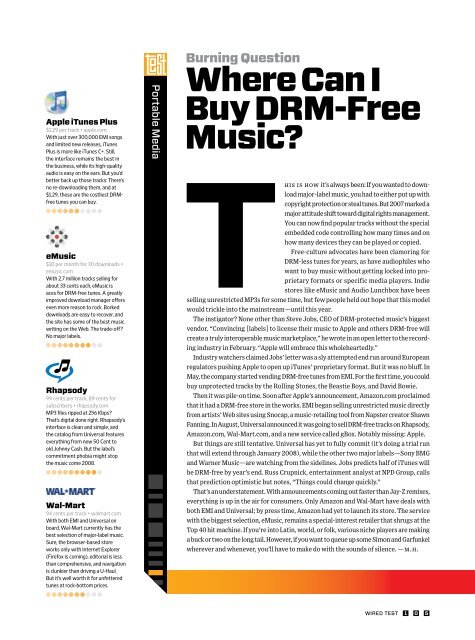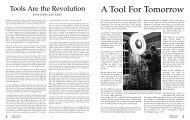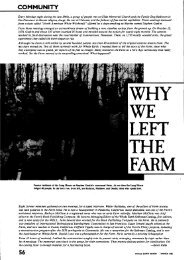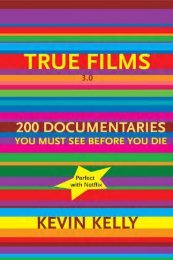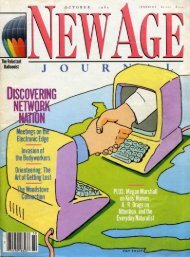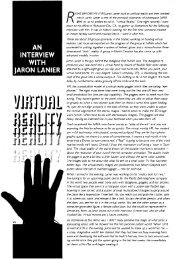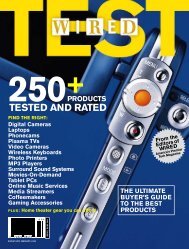You also want an ePaper? Increase the reach of your titles
YUMPU automatically turns print PDFs into web optimized ePapers that Google loves.
Apple iTunes Plus<br />
$1.29 per track • apple.com<br />
With just over 300,000 EMI songs<br />
and limited new releases, iTunes<br />
Plus is more like iTunes C+. Still,<br />
the interface remains the best in<br />
the business, while its high-quality<br />
audio is easy on the ears. But you’d<br />
better back up those tracks: There’s<br />
no re-downloading them, and at<br />
$1.29, these are the costliest DRMfree<br />
tunes you can buy.<br />
eMusic<br />
$10 per month for 30 downloads •<br />
emusic.com<br />
With 2.7 million tracks selling for<br />
about 33 cents each, eMusic is<br />
aces for DRM-free tunes. A greatly<br />
improved download manager offers<br />
even more reason to rock. Borked<br />
downloads are easy to recover, and<br />
the site has some of the best music<br />
writing on the Web. The trade-off?<br />
No major labels.<br />
Rhapsody<br />
99 cents per track, 89 cents for<br />
subscribers • rhapsody.com<br />
MP3 files ripped at 256 Kbps?<br />
That’s digital done right. Rhapsody’s<br />
interface is clean and simple, and<br />
the catalog from Universal features<br />
everything from new 50 Cent to<br />
old Johnny Cash. But the label’s<br />
commitment phobia might stop<br />
the music come 2008.<br />
Wal-Mart<br />
94 cents per track • walmart.com<br />
With both EMI and Universal on<br />
board, Wal-Mart currently has the<br />
best selection of major-label music.<br />
Sure, the browser-based store<br />
works only with Internet Explorer<br />
(Firefox is coming), editorial is less<br />
than comprehensive, and navigation<br />
is clunkier than driving a U-Haul.<br />
But it’s well worth it for unfettered<br />
tunes at rock-bottom prices.<br />
Portable Media<br />
Burning Question<br />
Where Can I<br />
Buy DRM-Free<br />
Music?<br />
This is how it’s always been: If you wanted to download<br />
major-label music, you had to either put up with<br />
copyright protection or steal tunes. But 2007 marked a<br />
major attitude shift toward digital rights management.<br />
You can now find popular tracks without the special<br />
embedded code controlling how many times and on<br />
how many devices they can be played or copied.<br />
Free-culture advocates have been clamoring for<br />
DRM-less tunes for years, as have audiophiles who<br />
want to buy music without getting locked into proprietary<br />
formats or specific media players. Indie<br />
stores like eMusic and Audio Lunchbox have been<br />
selling unrestricted MP3s for some time, but few people held out hope that this model<br />
would trickle into the mainstream—until this year.<br />
The instigator? None other than Steve Jobs, CEO of DRM-protected music’s biggest<br />
vendor. “Convincing [labels] to license their music to Apple and others DRM-free will<br />
create a truly interoperable music marketplace,” he wrote in an open letter to the recording<br />
industry in February. “Apple will embrace this wholeheartedly.”<br />
Industry watchers claimed Jobs’ letter was a sly attempted end run around European<br />
regulators pushing Apple to open up iTunes’ proprietary format. But it was no bluff. In<br />
May, the company started vending DRM-free tunes from EMI. For the first time, you could<br />
buy unprotected tracks by the Rolling Stones, the Beastie Boys, and David Bowie.<br />
Then it was pile-on time. Soon after Apple’s announcement, Amazon.com proclaimed<br />
that it had a DRM-free store in the works. EMI began selling unrestricted music directly<br />
from artists’ Web sites using Snocap, a music-retailing tool from Napster creator Shawn<br />
Fanning. In August, Universal announced it was going to sell DRM-free tracks on Rhapsody,<br />
Amazon.com, Wal-Mart.com, and a new service called gBox. Notably missing: Apple.<br />
But things are still tentative. Universal has yet to fully commit (it’s doing a trial run<br />
that will extend through January 2008), while the other two major labels—Sony BMG<br />
and Warner Music—are watching from the sidelines. Jobs predicts half of iTunes will<br />
be DRM-free by year’s end. Russ Crupnick, entertainment analyst at NPD Group, calls<br />
that prediction optimistic but notes, “Things could change quickly.”<br />
That’s an understatement. With announcements coming out faster than Jay-Z remixes,<br />
everything is up in the air for consumers. Only Amazon and Wal-Mart have deals with<br />
both EMI and Universal; by press time, Amazon had yet to launch its store. The service<br />
with the biggest selection, eMusic, remains a special-interest retailer that shrugs at the<br />
Top 40 hit machine. If you’re into Latin, world, or folk, various niche players are making<br />
a buck or two on the long tail. However, if you want to queue up some Simon and Garfunkel<br />
wherever and whenever, you’ll have to make do with the sounds of silence. —m.h.<br />
WIRED TEST<br />
1 0 5


